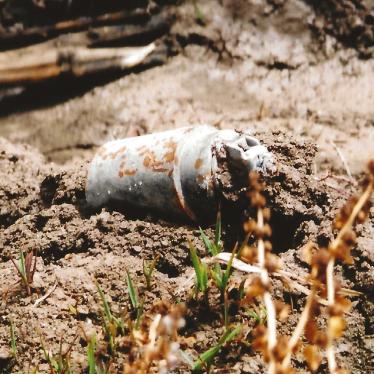(Dubrovnik) – Nations attending a milestone meeting of the international treaty banning cluster munitions have issued a declaration condemning their use by any party, Human Rights Watch said today. At the first five-year review conference of the treaty, Cuba said it will ban cluster munitions and join the treaty.
The 62 states parties participating in the First Review Conference of the Convention on Cluster Munitions adopted the Dubrovnik Declaration on September 9, 2015, after an intense effort by the United Kingdom, Australia, and Canada to weaken wording responding to recent use of the banned weapons in several conflicts. After the declaration was adopted, those three nations and Lithuania expressed reservations with the declaration’s condemnation of “any use of cluster munitions by any actor.”
“The Dubrovnik Declaration contains a strong message to armed forces that still cling to cluster munitions that using them will bring a firestorm of condemnation,” said Steve Goose, arms director at Human Rights Watch and chair of the Cluster Munition Coalition, an international group of organizations working to end the use of the weapons. “An attempt by three treaty members to weaken the message failed, and the message to them is that they need to live up to the treaty’s unequivocal and comprehensive prohibition on these weapons.”
Numerous governments, as well as the United Nations, International Committee of the Red Cross, and the Cluster Munition Coalition, have condemned the use of cluster munitions in the past year in Libya, Sudan, Syria, Ukraine, and Yemen (by Saudi Arabia). None of these countries are part of the treaty.
Cluster munitions pose an immediate threat to civilians by scattering submunitions or bomblets over a wide area. They continue to pose a threat after a conflict ends by leaving remnants, including submunitions that fail to explode upon impact and become de facto landmines. The treaty has been signed by 117 countries, and 96 of them have ratified it.
Among the highlights of the Review Conference:
- Cuba announced that “due to recent developments” it is now initiating a process to accede to the treaty;
- Colombia ratified the convention during the Review Conference, on September 10, becoming the 96th state party;
- Mozambique and Sweden announced that they have completed destruction of their stockpiles of cluster munitions. Germany said it would finish in the coming weeks, and Italy said it would complete destruction in October. At that point, a total of 28 states parties will have finished destroying their stockpiles, all well in advance of the treaty’s eight-year deadline;
- Ten countries that have signed, but not yet ratified the treaty participated in the conference. One was Palau, which said it expected to ratify shortly; and
- Twenty-two countries that have not signed the treaty attended as observers. One of them, South Sudan, said that it would join the treaty “very soon.”
The convention obliges states parties to adopt national implementation measures, including legislation, to carry out the provisions of the treaty, but only 24 countries have done so. Human Rights Watch issued a report on September 3, 2014, outlining key elements that should be included in strong legislation to implement the treaty.
Cluster munitions have been used in more than 30 countries since the end of World War II, including in the former Yugoslavia – Bosnia and Herzegovina, Croatia, and Serbia – in the 1990s and Kosovo in 1999-2000.
Human Rights Watch is a co-founder of the international Cluster Munition Coalition, and Goose served as the head of the coalition’s delegation at the review conference. Human Rights Watch gave presentations for delegates at side events about Cluster Munition Monitor 2015, the coalition’s annual report on the status of the treaty; national legislation; recent use of cluster munitions; and use of explosive weapons in populated areas.






